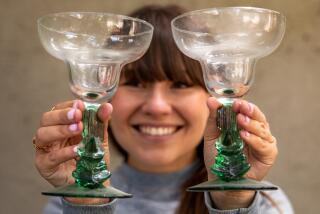Being a Lord Has Its Price in L.A.: For You, $75,000
- Share via
Pssst! Wanna buy a used lordship?
The Lordship of Holme, perhaps, which was held by the first Fauconberg Lord of Holme in the 13th Century? Or the Lordship of Faddiley? Or maybe the Lordship of Farndon, which was held by Lady Godiva during the reign of Edward the Confessor?
Well, times are tough and some of the British aristocracy have been selling their lordships at auction to the highest bidders. And David Ross, a 31-year-old London entrepreneur, is in Los Angeles with 15 titles for buyers who’d like to tack a lord onto their calling card or Visa.
Ross, who is here until Tuesday and is also peddling old-style English telephone booths, has targeted Beverly Hills and Bel-Air for a direct mail and newspaper ad campaign, reasoning, “They can spend $200,000 for a Rolls-Royce. What’s $75,000 for a lordship?”
There could be a slight catch.
Most Reportedly Sold at Auction
According to the chairman of the Manorial Society of Great Britain, which oversees these auctions, Ross doesn’t own any of the 15 lordships he’s come here to sell. Most were sold at auction in July in London to other people, Robert Smith said, and some were withdrawn for lack of a high-enough bid.
“Never heard of him, never heard of him,” said Smith, contacted by telephone about Ross and his firm, the London Telephone Box Co. Quickly checking his files, Smith concluded, “He’s obviously got hold of one of our catalogues. It’s absolutely outrageous.”
But Ross contends his claims to ownership are “a hundred per cent genuine.”
“We bought all of them in different names in trust,” he said, explaining that it was done partially “for tax reasons.”
He added, “This is highly confidential. I can’t divulge the names we bought them in but (the lordships) will all transfer with no problem at all.”
“What I’ve told you is 110% true,” he maintained. “The 15 titles I’ve given you are all available.”
Ross’ $10,000 price tag for the red cast iron London telephone boxes (“we have about 263 in stock and you can’t get anymore”) was also questioned by Paul Graber, a British Telecommunications executive.
“There are an awful lot of them around,” available on the open market at $400 apiece, said Graber, adding that over a five-year period the company is phasing out 78,000 of the vandal-prone kiosks, preserving a few for history’s sake and disposing of the others at auction. Very rare, very old ones (Ross does not have these) might bring $2,500, he added.
Ross says for $75,000, you get the lordship, plus a copy of the Domesday Book (the survey ordered in 1086 by William the Conqueror which lists 13,418 lordships), a gold signet ring with the acquired family crest, a family tree, and membership in the Manorial Society.
He acknowledges the title won’t get you invited to tea at Buckingham Palace (where he said he once visited at the invitation of a friend of a friend who was a royal chambermaid).
But since his partner, Alain Levenfiche (now Alain Levenfiche, Lord of Runhall Popes) bought his, Ross added, he has found “it helps him a lot, particularly when he travels”--virtually automatic upgrades to presidential suites and first-class sections of airplanes.
Ross said he is also acquiring a lordship--he has The Lordship of Great Stanmore “in escrow.” He chose this one, he explained, because it had a certain snob appeal, like being, as he put it, “The Lord of Brentwood.”
But the Manorial Society’s Smith said, “We withdrew Great Stanmore from the sale. it was never sold.”
Smith said Levenfiche did buy the Lordship of Runhall Popes “in our November sale” and paid 8,750 pounds, less than $15,000, for it.
But, checking the list of Ross’ other “properties,” Smith determined that the Lordship of Holme was bought by an Annis Abraham of Cardiff, Wales; the Lordship of Faddiley by an F. J. Reed, who lives in Faddiley in Cheshire; the Lordship of North Clifton by a Mr. Blustein, who lives in London, the Lordship of Castle Northwich by a Ronald Dobson who lives in Northwich. . . .
Could any be connected to the London Telephone Box Co.? Smith placed a quick call to Thomas Dawson of Northumberland, who, according to the society’s records, bought the Lordship of Farndon, which Ross has for sale. “Mr. Dawson doesn’t know these people at all,” Smith said.
Asked specifically about Thomas Dawson, Ross said, “I’m not prepared to say anything.”
Ross said he and his partner “virtually cornered the market” at the July auction, but did not want it known that they were snapping up most of the lordships. “They would prefer that the titles not be exported,” he said. “That is the main consideration, really.”
As for Great Stanmore, Ross said, “It was withdrawn from sale because I’ve got an option on it.”
He added, “We’re obviously quite experienced, Mr. Levenfiche and myself, at getting things our way by using different names and making sure things aren’t bid so we get the price down. We had it organized that way.”
Given that there are people in Beverly Hills or Bel-Air with the $75,000 needed for a lordship, what exactly would they get?
“They don’t give the buyer any rank or privileges of any kind whatsoever,” said Charles Kidd, editor of “DeBrett’s Peerage and Baronetage,” the bible of British aristocracy. “The majority of them are rather meaningless.”
He added, “A lot of people think you can then go around calling yourself Lord Snodgrass. You can’t. Lord implies you have a title of some sort.”
In England, Kidd said, “I think everyone knows that these are titles that can be bought and sold--empty titles. There are thousands of them.” When told of Ross’ asking price of $75,000, Kidd replied, “That seems a staggering amount of money to pay for nothing.”
The Manorial Society’s Smith said the average asking price when lordships were first put up for auction in 1981 was about $3,200 and that some early buyers have resold them and taken their profit. Today, he said, your average lordship, without land, runs $28,000.
“There actually is a very limited supply,” Smith said. “They’re very ancient. They go right back to the Norman Conquest.”
The idea of putting them on the auction block is, in his view, “a bit jokey.” Still, he said, it does serve to preserve the documents, a little piece of history. And, he said, “The aristocracy in this country have been so heavily taxed. This is sometimes a less painful way of obtaining much-needed cash than selling portraits of the ancestors.
“We have auctions of maybe 40 at any one time,” Smith said. “We’re putting forward another sale in October, at which we shall be offering 40. We have these about four or five times a year.”
The London Telephone Box Co. requires a $20,000 good faith deposit, preferably in cash or check, on purchase of lordships, and $2,000 on telephone boxes, while proper contracts are drawn up.
Ross points out that the telephone box price includes sandblasting and shipping.
His sales campaign is in its infancy, Ross added, and though he has yet to sell either a $10,000 telephone booth or a $75,000 lordship in this country, “We don’t have to take silly offers. We’re not desperate.”
“Americans,” he added, “love all this English heritage.”
And how do the rightful heirs to lordships feel about all this?
“I don’t really care, to be blunt” Ross said. “Business is business.”
More to Read
Inside the business of entertainment
The Wide Shot brings you news, analysis and insights on everything from streaming wars to production — and what it all means for the future.
You may occasionally receive promotional content from the Los Angeles Times.










